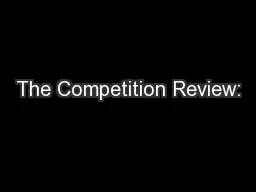PDF-Understanding competition law
Author : edolie | Published Date : 2022-09-06
Competitionlaw 2004 Fair Trading OFT has the power to apply and enforce Articles 81 and 82 ofthe EC Treaty in the United Kingdom The OFT also has the power to applysame
Presentation Embed Code
Download Presentation
Download Presentation The PPT/PDF document "Understanding competition law" is the property of its rightful owner. Permission is granted to download and print the materials on this website for personal, non-commercial use only, and to display it on your personal computer provided you do not modify the materials and that you retain all copyright notices contained in the materials. By downloading content from our website, you accept the terms of this agreement.
Understanding competition law: Transcript
Download Rules Of Document
"Understanding competition law"The content belongs to its owner. You may download and print it for personal use, without modification, and keep all copyright notices. By downloading, you agree to these terms.
Related Documents














